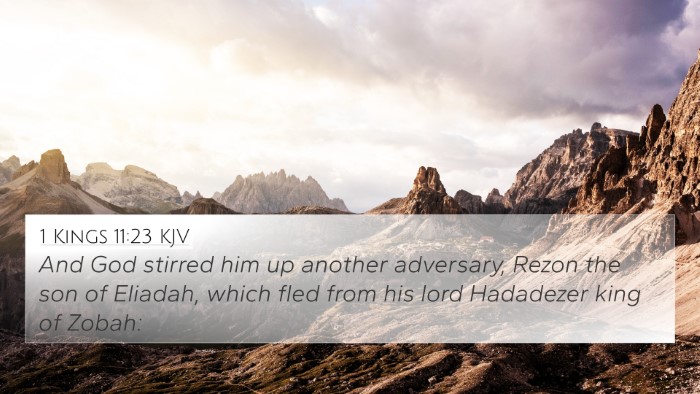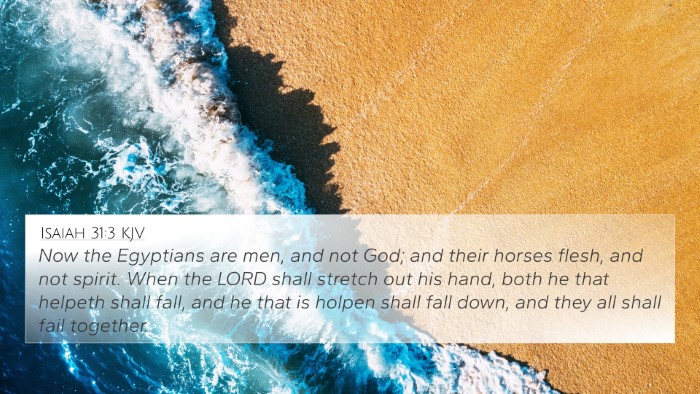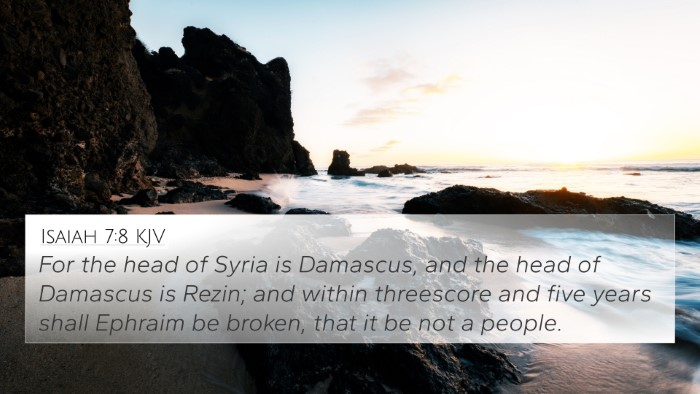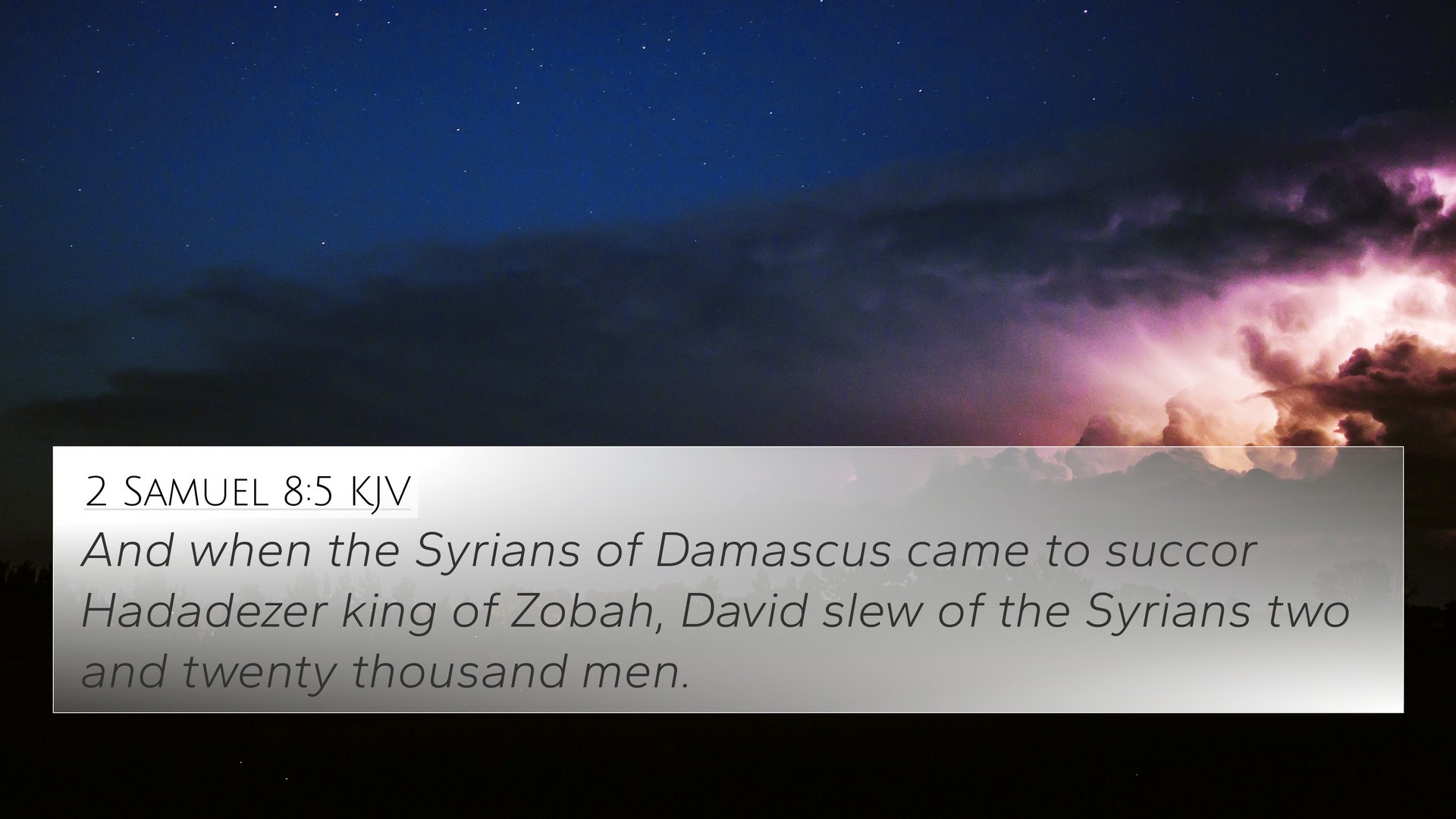Old Testament
Genesis Exodus Leviticus Numbers Deuteronomy Joshua Judges Ruth 1 Samuel 2 Samuel 1 Kings 2 Kings 1 Chronicles 2 Chronicles Ezra Nehemiah Esther Job Psalms Proverbs Ecclesiastes Song of Solomon Isaiah Jeremiah Lamentations Ezekiel Daniel Hosea Joel Amos Obadiah Jonah Micah Nahum Habakkuk Zephaniah Haggai Zechariah Malachi2 Samuel 8:5 Similar Verses
2 Samuel 8:5 Cross References
And when the Syrians of Damascus came to succor Hadadezer king of Zobah, David slew of the Syrians two and twenty thousand men.
Uncover the Rich Themes and Topics of This Bible Verse
Listed below are the Bible themes associated with 2 Samuel 8:5. We invite you to explore each theme to gain deeper insights into the Scriptures.
2 Samuel 8:5 Cross Reference Verses
This section features a detailed cross-reference designed to enrich your understanding of the Scriptures. Below, you will find carefully selected verses that echo the themes and teachings related to 2 Samuel 8:5 KJV. Click on any image to explore detailed analyses of related Bible verses and uncover deeper theological insights.

1 Kings 11:23 (KJV) »
And God stirred him up another adversary, Rezon the son of Eliadah, which fled from his lord Hadadezer king of Zobah:

2 Samuel 8:3 (KJV) »
David smote also Hadadezer, the son of Rehob, king of Zobah, as he went to recover his border at the river Euphrates.

1 Chronicles 18:5 (KJV) »
And when the Syrians of Damascus came to help Hadarezer king of Zobah, David slew of the Syrians two and twenty thousand men.

Psalms 83:4 (KJV) »
They have said, Come, and let us cut them off from being a nation; that the name of Israel may be no more in remembrance.

Isaiah 31:3 (KJV) »
Now the Egyptians are men, and not God; and their horses flesh, and not spirit. When the LORD shall stretch out his hand, both he that helpeth shall fall, and he that is holpen shall fall down, and they all shall fail together.

Isaiah 7:8 (KJV) »
For the head of Syria is Damascus, and the head of Damascus is Rezin; and within threescore and five years shall Ephraim be broken, that it be not a people.

Isaiah 8:9 (KJV) »
Associate yourselves, O ye people, and ye shall be broken in pieces; and give ear, all ye of far countries: gird yourselves, and ye shall be broken in pieces; gird yourselves, and ye shall be broken in pieces.
2 Samuel 8:5 Verse Analysis and Similar Verses
Summary of 2 Samuel 8:5
2 Samuel 8:5 reads: "And when the Syrians of Damascus came to succor Hadadezer king of Zobah, David slew of the Syrians two and twenty thousand men." This verse describes a military victory of King David over the Syrians who had allied with Hadadezer, the king of Zobah.
This passage illustrates several key themes and concepts, including God's providential guidance in the affairs of nations, the nature of divine favor on David, and the consequences of rebellion against Israel. A summary of commentary insights is organized below.
Insights from Public Domain Commentaries
-
Matthew Henry's Commentary:
Matthew Henry emphasizes the significance of this victory as a demonstration of God's support for David's kingship. He notes that David's military successes are indicative of divine favor and a fulfillment of God's promises to him. The act of slaying the Syrians is viewed as not just a military achievement but a moral imperative, defending Israel against those who sought to harm it.
-
Albert Barnes' Notes:
Albert Barnes highlights the strategic alliances in the region during this time, noting that Hadadezer was a potent adversary. He explains that the defeat of the Syrians represented a critical moment for David, solidifying his power and expanding Israel's territories. Barnes also discusses the significance of military strength in ancient near Eastern cultures and how it influenced leadership and governance.
-
Adam Clarke's Commentary:
Adam Clarke adds a historical perspective, indicating that the Syrians were a significant power at the time, and David’s victory was crucial in establishing Israel's dominance. He also mentions the implications of this battle for the surrounding nations, instilling fear and respect for David's rule. Clarke emphasizes the idea of territorial expansion and the necessity for security in regional politics.
Bible Cross-References
- 1 Chronicles 18:5 - "And when the Philistines hear that David was anointed king over all Israel..." This verse relates to the wider context of David's military conquests and battles with neighboring nations.
- Psalm 60:1-12 - A psalm reflecting on victories and reliance on God, connecting themes of divine assistance in warfare.
- 2 Samuel 10:15-19 - This passage discusses David's ongoing conflicts with the Ammonites and Syrians, providing further detail on the interconnected nature of these battles.
- 1 Samuel 7:10 - This verse describes the Lord's intervention in battles, linking the theme of divine support in David's military campaigns.
- 2 Samuel 5:20 - This refers to David's victory over the Philistines, showcasing God's power in providing success against military foes.
- Isaiah 17:1 - A prophecy about Damascus, reflecting the significance of this city in the Old Testament narratives of military conflict.
- Jeremiah 49:23-27 - Discusses prophecies regarding Damascus and adds depth to understanding the geopolitical landscape of the time.
Theological Themes
- Divine Sovereignty - The victory illustrates God's control over nations and leaders, affirming His role in David’s rise.
- Covenant Promises - This victory aligns with God’s covenant with David, showing that God fulfills His promises through protection and success in battle.
- Consequences of Rebellion - The fate of the Syrians serves as a warning about the consequences of opposing God’s appointed king.
- Moral Duty of Leadership - David’s role as a warrior king reflects the moral responsibility of rulers to protect their people and uphold justice.
Connections and Comparisons
- Other verses detailing David’s military prowess and God's support include 1 Samuel 18:14 and 2 Samuel 7:1-3.
- Comparative analysis with the military campaigns of Joshua in Joshua 10:8-14, showing continuity in divine support for leaders commissioned by God.
- Examining the New Testament references, such as Romans 8:31, which echoes the theme of God being on the side of His people during conflicts.
Conclusion
The events of 2 Samuel 8:5 provide a crucial insight into the nature of David's reign and the establishment of Israel as a significant power. The victory over the Syrians is not merely a historical account, but it holds deep theological implications about divine providence, the responsibilities of leadership, and the integrity of God's promises. Through examining various biblical cross-references and themes, we enhance our understanding of how scripture interconnects and speaks into the lives of believers today.



